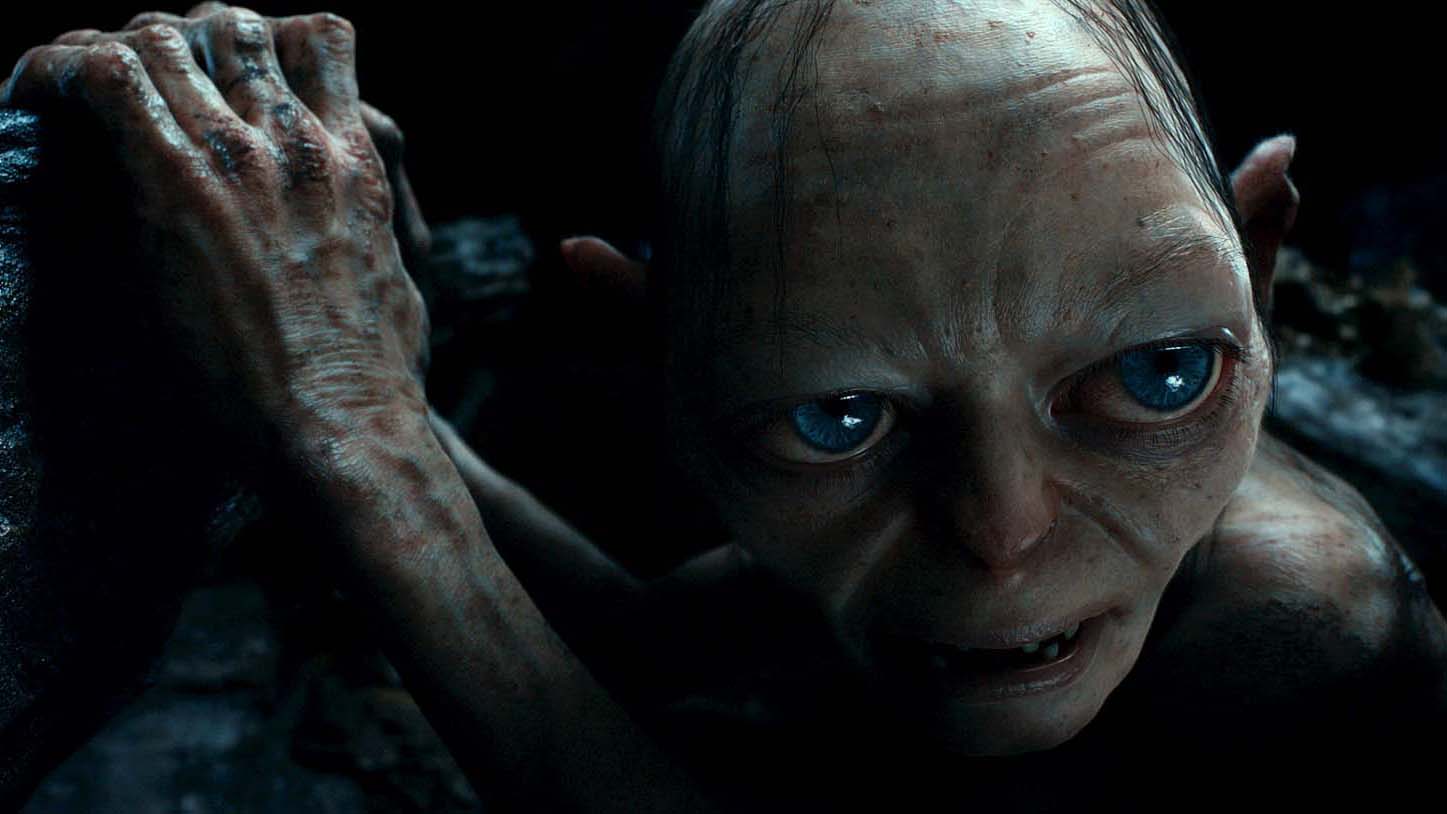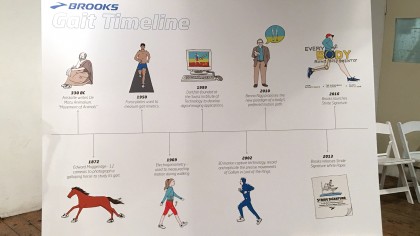How Gollum could help you buy the right running shoes
Please tech, help me find some decent trainers

I want to admit something. Something most runners won't talk about. Won't admit. Feel ashamed to even bring it up, for fear of looking stupid… and it affects both the complete beginner and experienced trotter.
I've been running for seven years and I have no idea how to buy running trainers. Seriously, it's a complete mystery to me.
The thought process goes: some trainers are bouncy and that is good because they feel nice and can bounce you along faster but some trainers are very not bouncy and that is good as they make you not injured and some trainers are not there because barefoot running is actually what we should be doing and trainers are all a con.
But which is best? I've used Adidas UltraBoost because they have technologically advanced bouncy soles to return energy means I'll go faster without putting in more effort. Nice one.
I've also tried the Nike Air Zoom Elite 8, which return energy through the cleverly-made structure guiding your foot and springing back - they feel more 'clumpy' to me, but I can see they'd feel good if you like a bit more structure in your foot.
But that's where I run into the confusion: how do I know what shoes I like the most? Obviously ones that don't hurt, but am I supposed to go for more cushioning? Or is one that lets me 'feel' the road going to help strengthen my legs - and that's before even getting into the minimalist / barefoot shoes that mimic the feel of running with nothing at all?
Ask any barefoot advocate and they'll spend hours telling you how running like a caveman will rid you of injury and the recent trend of 'advanced' running shoes is actually creating more pain than ever before.
Sign up for breaking news, reviews, opinion, top tech deals, and more.
Given I've barely got enough money to buy fancy sports beans for my longs runs at the end of each month, I don't want to be wasting anything on the wrong shoes - so what am I supposed to do?
My shoes can sign my name
Given the name of this column, the answer will always lie with technology - with so many advances coming in monitoring the human body, surely there has to be something out there which can tell me what shoes I'm supposed to wear?
The obvious answer is gait analysis - many sports shops are starting to offer this, and it's traditionally been seen as the 'smart thing' to do if you're going to start running. You hop on a treadmill, they watch and film your legs, and then the learned shop assistant will recommend a shoe that will help offset anything that's wrong with your running style.
But, as usual, someone thinks that's not advanced enough. I spent some time with trainer manufacturer Brooks this week, looking at how the brand is trying to change the way we think about the running shoe we pick.
The reason the brand is talking about this subject now is that it's about to bring out Stride Signature - a system to 'educate' consumers that everyone has a different body shape and therefore runs differently - meaning conventional wisdom about over-pronating (your foot rolling in underneath you when running, and needing to be corrected badly) might not be incorrect.
The theory behind Stride Signature was developed thanks to advances in digital imaging at the turn of the century, but it was the ground-breaking motion capture from Lord of the Rings that gave a new understanding in the way the human body moves.
Previously research was limited to running on plates and measuring the angles and changes of the human body as it moved - but with the new motion capture systems being used in movies, it opened up new information on how the body worked.

This allowed scientists to realise how motion affected the body from top to bottom when running - and helped build understanding that perhaps moving your foot in a different way to the norm was just that: you running differently, not necessarily worse.
"When it comes to supportive footwear, we need to allow the foot to move as it's meant to during weight bearing," said James Dunne, a sports rehab therapist and running coach from Kinetic Revolution I spoke to separately to see if the ideas put forward make sense.
"If we encase that [too much] and stop it from moving properly, that's going to have consequences perhaps at the knee or higher up. It's a zero sum gain: we're just moving the stress around the body.
"The other side of that is if we see too much movement, and there is a history of running injury, particularly lower leg injuries, then potentially support could be a good thing."
Dunne's words echo what's being worked on by Brooks: that people need to think about what's going on with the foot in relation to the whole body and use that thinking to address which shoe to buy, not just see if it moves a bit left or right when you're running.
The annoying thing is that Stride Signature isn't actually a hardware- or software-based system - it's just a way of trying to educate retailers and consumers to think more holistically about what kind of shoe they need. The brand is trying to get retailers to expand their gait analysis to encompass more of the body, but for now you'll need specialist coaches to achieve that.
And you can't say Brooks is doing this for completely altruistic reasons either - it has a dizzying array of shoes (which it claims is for the very purpose of giving users choice) and therefore anything that helps users pick through them makes sense.
BUT WHICH SHOES SHOULD I BUY?
Having been through the process outlined by Brooks, I definitely felt I understood what each shoe would do for me much better thanks to the science behind it.
But it still left me with a quandary: what kind of shoe do I actually like? Do I want something that supports me? Do I like loads of cushioning or not? I don't have enough money to keep trying different styles, so where do I begin?
"Find somewhere that will let you try a few pairs on and don't get too drawn into whatever is the new 'hype' in trainers, go for something that's tried and tested," advised Dunne.
"Unless you've got a specific reason to need a particularly supportive shoe, I'd just go for a firm but neutral shoe, as a starting point."
That's always been a worry for me: am I doing myself an injury by not choosing the wrong kind of cushioning for me? Are my arches being supported? What bit actually is the arch?
"I have worked in running retail on the shop floor, and I'm absolutely adamant that a lot of runners end up overly supported," said Dunne.
"I would err on the side of trying to run with, well, not as little 'structure' as possible, as that's going to start getting people thinking about going down the minimalist or barefoot route. But certainly ask questions if you're being thrown into something heavily supportive.
"Unless you have a history of running injury, in which case hopefully the advice has come from a physiotherapist, rather than on the shop floor."
To summarise: get good shoes, unless something hurts - then talk to someone professional and get the kind of shoes they tell you to. Easy.
- If you've got any tips, tech you want tested out or just want to mock me, I'm @superbeav on Twitter, and you can see my stumblings on Strava too.
- If you want to see more data, follow me on Smashrun - if you want to sign up, please use this link - once you see the service, you'll work out why...
- Check out the best running shoes for a greater selection over on T3
- Read the rest of the Running Man of Tech story here

Gareth has been part of the consumer technology world in a career spanning three decades. He started life as a staff writer on the fledgling TechRadar, and has grew with the site (primarily as phones, tablets and wearables editor) until becoming Global Editor in Chief in 2018. Gareth has written over 4,000 articles for TechRadar, has contributed expert insight to a number of other publications, chaired panels on zeitgeist technologies, presented at the Gadget Show Live as well as representing the brand on TV and radio for multiple channels including Sky, BBC, ITV and Al-Jazeera. Passionate about fitness, he can bore anyone rigid about stress management, sleep tracking, heart rate variance as well as bemoaning something about the latest iPhone, Galaxy or OLED TV.